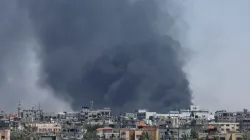Defiant Israel steps up military strikes in Gaza's Rafah after ICJ orders it to halt offensive
The International Court of Justice ordered Israel to halt its Rafah offensive in the wake of widespread destruction, although Israel was expected to ignore it. Israeli PM Netanyahu called the order "false, outrageous and morally repugnant" and insisted that Israel was defending its citizens.

Gaza: Israeli forces stepped up military strikes in Gaza on Friday, with planes bombing targets in the southern city of Rafah despite the International Court of Justice, the UN's top court, ordering Israel to halt its offensive there, according to residents and medics. Heavy fighting was also reported in the northern Gaza area of Jabalia where Israel's military said it had recovered the bodies of three hostages killed during the Hamas-led attacks on October 7 that triggered the war.
In Rafah, where an escalating Israeli assault has sent hundreds of thousands of people fleeing from what was one of the few remaining places of refuge, residents reported intensifying aerial and ground bombardment in the south and centre of the city that borders Egypt. Residents and Palestinian media reported a series of strikes hitting roads and houses in the Shaboura neighbourhood in central Rafah shortly after the ICJ ruling was read out in The Hague.
The ICJ, also known as the World Court, ordered Israel on Friday to immediately halt its military operations in Rafah, which Israel was expected to ignore despite increasing international isolation as criticism mounts over its conduct in the nearly eight-month-long war. The order was adopted by a vote of 13-2, opposed only by judges from Uganda and Israel itself.
What did the ICJ ruling say?
Reading out the ruling, ICJ president Nawaf Salam said the situation in the Palestinian had worsened since the court last ordered Israel to take steps to improve it, and conditions had been met for a new emergency order. "The state of Israel shall (....) immediately halt its military offensive, and any other action in the Rafah governorate, which may inflict on the Palestinian group in Gaza conditions of life that could bring about its physical destruction in whole or in part," he said.
Highlighting the humanitarian crisis as a result of war, Salam said that Israel had not explained how it would keep the population safe during an evacuation of Rafah, or provide food, water, sanitation and medicine for the 800,000 Palestinians that had already fled the Israeli advance. The ICJ also ordered Israel to open the Rafah crossing to let the aid in from Egypt. Israel must provide access for investigators and report back on its progress within one month.
ICJ ruling 'false, morally repugnant': Netanyahu
Israel has repeatedly dismissed that accusation as baseless and had signalled it would ignore any ruling to halt its offensive by the court, which has no enforcement powers. It says it has no choice but to attack Rafah to root out the last battalions of Hamas fighters it believes are sheltering there. During a press briefing on Thursday, Avi Hyman, the government spokesperson said, “No power on earth will stop Israel from protecting its citizens and going after Hamas in Gaza.”
Israeli Prime Minister Benjamin Netanyahu's office rejected the allegations in the case brought by South Africa that Israel was carrying out genocide in Gaza as "false, outrageous and morally repugnant" and insisted that Israel was acting based on its right to defend its territory and its citizens. The impact of the ICJ ruling on Israeli policy is expected to be limited, beyond reinforcing a defiant national mood already stoked by the International Criminal Court prosecutor's decision to seek arrest warrants against Netanyahu and Defence Minister Yoav Gallant.
The White House on Friday said it has been "clear and consistent" on its position on Rafah after the UN court ordered Israel to halt its offensive in the area. The United States had earlier warned against an invasion of Rafah, where hundreds of thousands of Palestinians have aggregated and sought shelter after intense fighting broke out in the entire Gaza.
Bodies recovered in Gaza
In northern Gaza, medics said at least five Palestinians were killed when houses were hit in Jabalia and more were believed to be trapped under rubble, but that the area could not be reached due to the intensity of the bombardment. Meanwhile, the Israeli military said it recovered the bodies of three hostages who were taken in Gaza during the Hamas-led attack on October 7.
It said the bodies of Hanan Yablonka, Michel Nisenbaum and Orion Hernandez Radoux were recovered overnight in a joint operation by the army and the intelligence services in Jabalia. "We will not stop fighting for their freedom," said military spokesperson Rear Admiral Daniel Hagari in a televised statement announcing the recovery of the three bodies. "Every decent country would do the same."
Simultaneous Israeli assaults on the northern and southern edges of Gaza this month have caused a new exodus of hundreds of thousands of Palestinians fleeing their homes, and have cut off the main access routes for aid, raising the risk of famine. Residents said on Friday tanks had destroyed the local market and bulldozers continued to raze shops and property in Jabalia's narrow alleys. Hamas's armed wing said its fighters had engaged three tanks there.
(with inputs from agencies)
ALSO READ | 'I visited Palestine on Jordan's chopper and Israeli jets escorted my trip': PM Modi at India TV event

